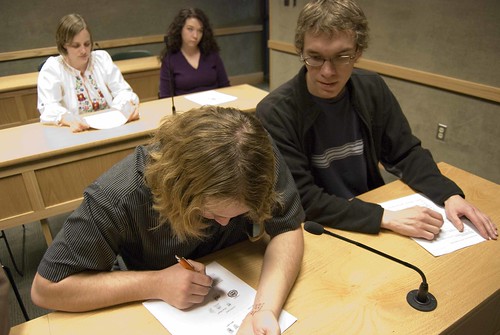Here's a simple idea for practicing the past simple with lower level students. I got it from Quora, a website that allows its users to ask and answer each other questions. Unlike other similar sites, you are required to sign up to get access, resulting in a higher calibre of contributions. If you're interested in the big questions, I recommend signing up.
Quora users were asked to share their life story in twenty lines, and I thought this would be a great practice for my pre-intermediate classes. Asking them to create a story to practice the past simple can be difficult for some learners as not everyone is a natural storyteller, but everyone has lived a life. It's also an opportunity for them to try out the tense in short sentences without having to worry about too much content.
Here's my suggestion for how the activity would run:
1) Ask students to think about the most important moments in their lives. Ask them to choose 5 and share them with their partner.
2) Show them an example “My Life in 20 Lines”. You could make your own life story if you feel comfortable sharing it with your students, or create an example. Here's one from the Quora page:
3) Ask them to note why number 20 is different (all the other use the past simple to talk about the past and 20 uses the present continuous to talk about how he feels now) 4) Ask students to write their own, possibly as homework. If you teach teenagers or young people, you could create some conditions, such as they are aged 19 or younger, they can write ten lines, between 20 to 30 years old, fifteen lines, and over 30's write twenty lines. 5) After you've given the students feedback on their writing, collect the students work and stick them up on the wall. Ask the students to go around and read them. Ask them to make a note of anything they didn't know about their colleagues. They can then discuss this in groups, asking follow questions as they talk about it. Check for their use of the past simple as they give more information about what happened.
Quora users can find more examples of 20 line life stories here.
Read more ►
Quora users were asked to share their life story in twenty lines, and I thought this would be a great practice for my pre-intermediate classes. Asking them to create a story to practice the past simple can be difficult for some learners as not everyone is a natural storyteller, but everyone has lived a life. It's also an opportunity for them to try out the tense in short sentences without having to worry about too much content.
Here's my suggestion for how the activity would run:
1) Ask students to think about the most important moments in their lives. Ask them to choose 5 and share them with their partner.
2) Show them an example “My Life in 20 Lines”. You could make your own life story if you feel comfortable sharing it with your students, or create an example. Here's one from the Quora page:
3) Ask them to note why number 20 is different (all the other use the past simple to talk about the past and 20 uses the present continuous to talk about how he feels now) 4) Ask students to write their own, possibly as homework. If you teach teenagers or young people, you could create some conditions, such as they are aged 19 or younger, they can write ten lines, between 20 to 30 years old, fifteen lines, and over 30's write twenty lines. 5) After you've given the students feedback on their writing, collect the students work and stick them up on the wall. Ask the students to go around and read them. Ask them to make a note of anything they didn't know about their colleagues. They can then discuss this in groups, asking follow questions as they talk about it. Check for their use of the past simple as they give more information about what happened.
Quora users can find more examples of 20 line life stories here.


























